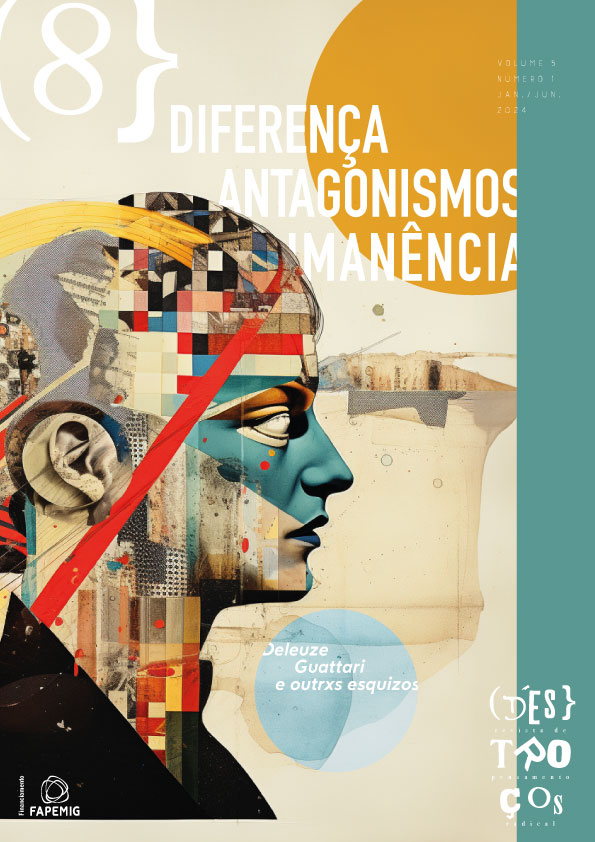Machination of contemporary subjectivities: a critique of identity in the name of singularity
Published 2024-10-08
Keywords
- Subjectivity,
- Singularity,
- Immanence,
- Resistance,
- Desire
Copyright (c) 2024 Gerson Carlos Rigoni Bonfá Junior

This work is licensed under a Creative Commons Attribution 4.0 International License.
How to Cite
Abstract
This article explores the mechanisms through which subjectivities are controlled by power in operations of transcendent individuation. In order to think about resistance to these operations of capturing power, we use a conceptual repertoire articulated from Nietzsche, Foucault, Deleuze and Guattari. Through this bibliographical exploration, we present how societies are constituted as factories equipped with machines and subjection technologies, and what changes over time is the way they operate and the machinery they have at their disposal. In the contemporary Western context, the capitalist machine prevails in this technology-subject relationship, whose main connection is power and desire. The movement of this text articulates concepts to violate certain images of thought whose praxis serves the subjectivation machinery that takes the subjects' desiring flows for themselves. It is concluded that it is necessary to cultivate life with ethical criteria that do not take into consideration transcendent, metaphysical or moral systems of judgment, but criteria of intensity that start from the recognition that life is strengthened not through conservation, but through immanent differentiation. Thus, we bet on the affirmative activity of an existence that, beyond modeling ideals, takes itself as a principle of singularization in an experience of subjective self-modeling.
References
- DELEUZE, Gilles. A imanência: uma vida... Trad. Tomaz Tadeu. Educação & realidade, v. 27, n. 2, pp. 10-18, 2002.
- DELEUZE, Gilles; GUATTARI, Félix. O que é a filosofia?. Trad. Bento Prado Jr. e Alberto Alonso Munoz. Rio de Janeiro: 34, 1992.
- DELEUZE, Gilles. Conversações. Trad. Peter Pál Pelbart. Rio de Janeiro: 34, 2010.
- DELEUZE, Gilles. Lógica do sentido. Trad. Luiz Roberto Salinas Fortes. São Paulo: Perspectiva, 2015.
- DELEUZE, Gilles; GUATTARI, Félix. Mil Platôs Vol. 1. Trad. Ana Lúcia de Oliveira, Aurélio Guerra Neto e Célia Pinto Costa. São Paulo: 34, 1995.
- DELEUZE, Gilles; GUATTARI, Félix. Mil Platôs Vol. 2. Trad. Ana Lúcia de Oliveira e Lúcia Cláudia Leão. Rio de Janeiro: 34, 1995.
- DELEUZE, Gilles; GUATTARI, Félix. Mil Platôs Vol. 5. Trad. Peter Pál Pelbart e Janice Caiafa. Rio de Janeiro: 34, 1997.
- DELEUZE, Gilles; GUATTARI, Félix. O Anti-Édipo: Esquizofrenia e Capitalismo. Trad. Luiz Orlandi. São Paulo: 34, 2010.
- DREYFUS, Hubert; RABINOW, Paul. Michel Foucault: Uma trajetória filosófica. Para além do estruturalismo e da hermenêutica. Trad. Vera Porto Carrero. Rio de Janeiro: Forense Universitária, 2010.
- DOSSE, François. O Deleuzismo: uma ontologia da diferença. In: Gilles Deleuze & Félix Guattari: biografia cruzada. Trad. Fátima Murad. Porto Alegre: Artmed, 2010. DOI: https://doi.org/10.3917/dec.dosse.2009.01
- FOUCAULT, Michel. Vigiar e Punir. Trad. Raquel Ramalhete. Petrópolis: Vozes, 1987.
- FOUCAULT, Michel. Dits et écrits. Paris: Gallimard, 1994.
- FREUD, Sgmund. Introdução ao narcisismo, ensaios de metapsicologia e outros textos. Trad. Paulo César de Souza. São Paulo: Companhia das Letras, 2010.
- GUATTARI, Félix; ROLNIK, Suely. Micropolítica: cartografias do desejo. 12. ed. Petrópolis: Vozes, 2013.
- HECKERT, Ana Lucia Coelho; ROCHA, Marisa Lopes da. A maquinaria escolar e os processos de regulamentação da vida. Psicologia & Sociedade, v. 24, pp. 85-93, 2012. Disponível em: http://www.scielo.br/pdf/psoc/v24nspe/13.pdf . Acesso em: 12 jul. 2016. DOI: https://doi.org/10.1590/S0102-71822012000400013
- INVISÍVEL, Comitê. Aos nossos amigos: crise e insurreição. Trad. Edições Antipáticas. São Paulo: n-1, 2016.
- MADERUELO, Javier. La pérdida del pedestal. Madrid: Cuadernos del Círculo, 1994.
- LAZZARATO, Maurizio. O governo das desigualdades: crítica da insegurança neoliberal. Trad. Ana Bigotte Vieira, Miguel Castro Caldas e Nuno Leão. São Carlos: EdUFSCar, 2011.
- LAZZARATO, Maurizio. Signos, máquinas, subjetividades. Signs, machines, subjectivities. Trad. Paulo Oneto. Edição bilíngue. São Paulo: n-1/Sesc, 2014.
- MARX, Karl. O Capital: Crítica da Economia Política, livro I: O processo de produção do capital. Trad. Rubens Enderle. São Paulo: Boitempo, 2013.
- NIETZSCHE, Friedrich. Ecce homo: como alguém se torna o que é. Trad. Paulo César de Souza. São Paulo: Companhia das Letras, 2004.
- NIETZSCHE, Friedrich. Além do bem e do mal. Trad. Paulo César de Souza. São Paulo: Companhia das Letras, 2005.
- NIETZSCHE, Friedrich. O anticristo. Trad. Paulo César de Souza. São Paulo: Companhia das Letras, 2007.
- NIETZSCHE, Friedrich. Assim falou Zaratustra: um livro para todos e para ninguém. Trad. Paulo César de Souza. São Paulo: Companhia das Letras, 2011.
- ROHDEN, Huberto. Roteiro Cósmico. São Paulo: Alvorada, 1985.
- ROLNIK, Suely. “Fale com ele” ou como tratar o corpo vibrátil em coma. In: FONSECA, Tania Mara Galli; ENGELMAN, Selda (Org.). Corpo, arte e clínica, 2004. pp. 231-238.
- VIESENTEINER, Jorge. Deleuze: ética como resistência e reinvenção. In: SGANZERLA, Anor; FALABRETTI, Ericson; BOCCA, Francisco. (Orgs.). Ética em Movimento. São Paulo: Paulus, 2009. pp. 283-296.
- VIESENTEINER, Jorge. Nietzsche e Deleuze: sobre a arte de transfigurar. Discusiones Filosóficas, v. 12, 2011, pp. 187-204.
- ZOURABICHVILI, François. O vocabulário de Deleuze. Trad. André Telles. Rio de Janeiro: IFCH-Unicamp, 2004.

